Wasp & Bee Nest Removal
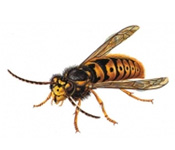
Wasps
Wasps are notoriously aggressive insects and will sting with little provocation. If a wasp nest is disturbed the wasps will readily attack the person responsible and others nearby and it is not unusual that people can experience multiple wasp stings. Most people experience a painful sting and discomfort for several days afterwards, but for a minority of people a single wasp sting can be potentially fatal if they suffer from anaphylactic shock.
You might find the actual wasp nest structure in a loft, shed or hanging on a tree or bush, or otherwise you might just see the wasps going in and out of the entrance hole to where the nest is located. If you do find a wasp nest at your home or business we strongly recommend that you call a professional pest controller such as Pest Defence Ltd to safely destroy it.
Feeding and foraging wasps can also be a serious problem in beer gardens, public parks, recreational areas, and in your garden at home, but Pest Defence can help to alleviate the problem.
Biology
There are several species of wasp commonly found in the UK.
The Common Wasp (Vespula Vulgaris) and German Wasp (Vespula germanica) are the most frequently encountered wasps and have a similar life cycle. The nests are relatively fragile in construction and are built in protected environments such as in lofts, sheds, wall cavities and many being underground.
Tree Wasps (Vespula (Dolichovespula) sylvestris), sometimes called the Euro Wasp or French Wasp are not as frequently encountered but are not uncommon. The nests of Tree Wasps are stronger in construction and are often built in hedges, shrubs, or are suspended from branches of trees. Tree Wasps are slightly larger than the common wasps, and because their nests are more vulnerable, they tend to be particularly aggressive if the nest or bush is disturbed. Many gardeners have been badly attacked whilst unsuspectingly pruning a bush or tree that holds a Tree Wasp Nest.
Wasps are social insects and new nests are constructed each year. Wasps’ nests last a single season and old nests are never reused. The Queen wasp emerges from hibernation in spring and begins to search for a nest site. The nest is made from chewed wood (similar to paper mache) and the nests can be constructed underground, in buildings, trees or bushes. The Queen wasp builds a small nest structure within which she lays the first eggs, which then hatch into grubs which become the first generation of worker wasps. At this stage the nest is about the size of a golf ball but soon grows as the number of worker wasps increases. The nest grows exponentially as the Queen lays more and more eggs into an ever enlarging nest until September when the nest may contain 20,000 or more worker wasps. The Queen then switches to the production of the next generation Male and Queen wasps which eventually leave the nest to mate with Males and Queens from other nests. The fertilised queens then search for suitable hibernation sites where they can survive the winter whilst the males, parent queen, and the remaining worker wasps die out. By the end of the year the nest is vacated of wasps and is never reused.
Wasp Nest Control & Removal
Wasp nests can be safely and effectively destroyed with a simple application of an approved insecticide. However, it is a job best left to an experienced pest controller using specialised applicators and personal protection. Wasp nests found in lofts or sheds can be treated and removed and high level wasp nests are usually easily destroyed using specialised applicators and extension lances. At Pest Defence, our equipment can reach the vast majority of high level wasp nests, although ladders or cherry pickers are occasionally employed. In 25 years, Pest Defence Ltd has never encountered a wasp nest that we are unable to destroy.
Control Of Feeding & Foraging Wasps
Problems with feeding or foraging wasps can be alleviated with the use of high performance wasp traps. Pest Defence Ltd supply a range of wasp traps containing a professional wasp attractant to successfully control feeding and foraging wasps and prevent the nuisance levels where large numbers are active outdoors.
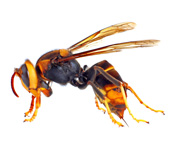
Hornets
The hornet (Vespa crabro) is the largest of the wasp family found in the UK. Hornets are more commonly found in rural or semi-rural environments particularly in or close to woodlands. They will construct their nests within buildings although they prefer hollows of trees in wooded areas. Unlike wasps they are predominantly carnivorous and are not attracted to human food and drinks. Consequently they are less likely to come into conflict with humans and as a result they are not a great threat to us. The sting of a hornet is more painful than that of the smaller wasps, but they are considerably less aggressive and less likely to sting, unless their nest is threatened.
Hornets are sometimes a nuisance to people living close to a hornets nest when attracted to the lights of the building at night. Hornets are drawn to the light and will repeatedly tap on windows and doors whilst the light is on, which can be unnerving for homeowners. This problem generally occurs late in the year when daylight hours are shortening and householders turn their lights on during the evening.
The biology of the hornet is similar to that of the other social wasps. The nests are constructed of chewed wood but are stronger in construction.
Pest Control
Hornets’ nests can be destroyed if constructed within buildings where they present a risk to homeowners and occupiers. The treatment is the same as that for wasps. Call Pest Defence for more advice and information if you have a problem with hornets.
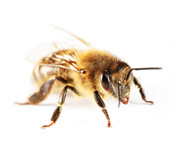
Honey Bees
Bees are essential for the pollination of fruit and flowers, and honey bees are important for the production of honey. There are many wild honey bees’ nests in our towns and countryside and there are many other farmed honey bee hives kept for honey production.
Honey Bees are not a protected species, but they are also not classified as a pest, and they should not be destroyed unless they have become established in a place where they present a threat to people, and where they cannot be collected by a bee-keeper.
Honey bees have a wasp shaped body (as opposed to the hairy fattened body of the bumble bee) and many people wrongly confuse them with wasps, although they are duller in colour and do not possess the striking yellow/black marking of wasps.
Problems with honey bees generally occur when they swarm, which can occur at any time through the summer but more commonly occurs during fair weather from mid-April to July. The swarm is created when the number of bees in the parent hive increases and a new queen bee is produced. The old queen leaves the hive with several thousand worker bees to search for a new home. The swarm will alight on a tree or bush, although they have been known to settle on man-made structures where they may stay for several hours or days. Small scouting parties numbering 50-200 bees then set out to investigate the potential nest sites in the local environment until eventually they find and move into their preferred new home. During this process householders and businesses commonly experience bees entering their properties, many of which are subsequently found dead on carpets and window sills, although this is usually a short lived problem as the bees move on in their search for a new home.
Whilst the swarm of bees has settled on the tree, bush or other structure, a bee keeper can be called to collect the swarm which will then be re-homed in a waiting hive. Many bee keepers are happy to collect swarms of honey bees and we at Pest Defence hold telephone numbers of several bee keepers to assist our customers.
If you have a problem with bees, you can call our experts at Pest Defence who will explain what is happening and whether it is anything to worry about. If the bees’ nest needs to be removed or destroyed we will advise you on the best course of action. Pest Defence exercises a duty of care to bees and a duty of care to our customers – Call Pest Defence for more advice and information if you have a problem with Honey Bees.
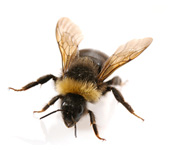
Bumble Bees
Bumble Bees are essential for the pollination of fruit and flowers. Bumble Bees are not a protected species, but they are also not classified as a pest, and they should not be destroyed unless they have become established in a place where they present a threat to people and domestic animals.
There are many species of bumble bees in the UK although their numbers are declining. Bumble bees have hairy rounded bodies and often possess colourful red, yellow or white markings. Bumble bees’ nests are irregular structures composed of a number of larval cocoons stuck together, and can be constructed underground, under sheds, in compost heaps, in loft insulation, or in bird boxes. The bumble bees’ nest lasts just one season and the activity typically ceases during June /July.
For those that nest in bird boxes, you may often see ‘swarms’ of bees flying around the nest. This is perfectly normal, and these are male bees, which often fly around nests, waiting for queens to come out so that they can mate. Male bees cannot sting, so please don’t be alarmed if you see this.
Bumble bees posses a sting and are very capable of stinging people and domestic animals, but they are actually very docile and will not normally sting unless squeezed (stood on or sat on) or if the nest is disturbed or threatened.
We at Pest Defence exercise both a dury of care to bees and a duty of care to our customers. Bumble bee nests can be destroyed if they present a risk to people (particularly children) and domestic animals, although we will endeavour to preserve the nest if we can sometimes by moving the bumble bees’ nest to safe location. Every year we relocate a number of bumble bees’ nests to safe locations and we have customers who will hapily accept the nests to be relocated into their gardens.
Call Pest Defence for more advice and information if you have a problem with a Bumble Bee nest.
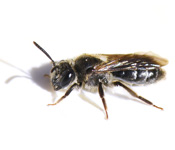
Solitary Bees
Solitary, Masonry and Mining Bees are essential for the pollination of fruit and flowers. These bees are not a protected species, but they are also not classified as a pest. They cannot sting and do no harm, so they should not be destroyed.
Masonry and Mining Bees are small bees with a relatively thin abdomen, similar in shape to honey bees and wasps. Unlike honey bees and bumble bees, these are not ‘social’ bees and do not build a collective nest or produce worker bees. All solitary bees are either queens or males and all behave independently of each other. However, large numbers of these bees can be seen active in the same area if they are all laying eggs in the same environment. There are about 100 British species of solitary bees and they are very commonly seen on sunny days between mid-April and mid-June.
During this period, Masonry and Mining Bees will excavate channels in soft sandstone or dry soil to construct chambers within which their grubs will develop. They busily fill the chambers with pollen collected from plants and flowers and then lay an egg in each chamber before sealing it. When all of their eggs have been laid the bees move away. The offspring bees hatch at a later date.
The myth that Masonry Bees can damage brickwork and mortar is absolutely untrue. However, they will excavate decaying mortar if it is soft enough for them to dig into, but they are just utilising existing decay and provide an indication that the mortar needs to be repaired. They cannot excavate good mortar. More often they will utilise existing imperfections in the building fabric and they will frequently construct their chambers in existing holes in the brickwork and mortar, in gaps around window and door frames, gaps at eaves, gaps under tiles, air brick holes and even in keyholes.
Mining Bees will excavate chambers in dry soil and are often seen flying over an area of ground in large numbers where numerous holes can be seen, each hole being circled by a rim of excavated soil. These bees are also creating chambers which they are busily filling with pollen and laying their eggs.
Another species of solitary bee, the leaf cutter bee, lines its egg chambers with leaf cuttings and they can be seen carrying section of leaves into their chambers to construct the egg cells. Many garden centres sell mortar bee boxes that attract these harmless bees into your garden and provide a suitable site for mortar bees and leaf cutter bees to construct their nests.
At Pest Defence , we know that solitary bees such as Mortar Bees, Masonry Bees and Leaf Cutter Bees are entirely beneficial and do not present a risk of harm to people, children or animals. Instead they should be conserved and encouraged.
If you have a problem with a Bees at your home or business and want good advice on whether or not anything needs to be done, please call Pest Defence Ltd. We will provide free advice and reassurance and we will deal with your bee problem if it needs to be dealt with.
At Pest Defence, we guarantee the total eradication of all wasps and bee nests on your property. Whether your infestation is at a high level, such as in a chimney crown or roof, or at a low level, such as in a basement or garage, our expert control team will deliver prompt, definitive results in wasp control.
We provide wasp control services for a wide area, including Colchester, Chelsmford, Brentwood and the surrounding areas of Essex and London.
Wasp & Bee Control Services
Our treatment begins with a comprehensive assessment of your property. We will identify the scope of the infestation, as well as the number and type of insects involved.
Many bees and wasps can be harmful. Their stings, at best, can cause slight pain and discomfort. At worst, wasp stings can be deadly; a single infliction can lead to anaphylactic shock. Our number one priority is to keep you safe, which is why we recommend never attempting to tackle a wasp nest removal yourself. Instead, call Pest Defence. We offer a same-day emergency response to any threat of bees or wasps in your vicinity.
Not all bees are harmful though; some are actually highly beneficial to the environment. Where possible, we aim to preserve bees by moving them either to a local beekeeper or an alternate safe location. If immediate elimination is required, we possess a variety of traps and eradication methods that will dramatically reduce the number of bees or wasps within minutes or hours, depending upon the size of the nest.
Local Wasp Nest Removal
We offer a range of wasp/bee pest control services, including:
- Wasp nest removal/wasp removal
- Bee nest removal/bee removal
- Hornet nest removal/hornet removal
Various factors can have a bearing on the wasp nest removal cost, including the size of the nest and its location, which is why we are unable to provide exact figures. You can, however, get a quote by speaking to our team who can attempt to provide an estimate for any bee or wasp nest removal service.
Wasp Nest Treatment
Wasp nest treatment from our expert team can take several forms, but may well include the use of specially tailored insecticides to yield swift results with the least disruption to your daily routine or your business. These include:
- Bayer Flying Insect Killer – An aerosol spray used to treat wasp nests directly as well as for other flying insects.
- Ficam D – An insecticide dust applied to the entrance of a nest, ensuring wasps carry it internally to eradicate the colony.
- Vulkan P5 – A pyrethroid-based powder that is applied to the nest entrance to allow wasps to distribute the insecticide further into the hive.
- Pybuthrin 33 – An oil-based insecticide spray containing pyrethrins to control and flush out flying insects such as wasps.
It is vitally important that any insecticide or wasp treatment is handled and applied very carefully. We have both the knowledge to know which approach is best suited to your wasp issue and the experience to do so safely on your premises.
The treatments above are examples and our approach will vary upon further analysis of each individual scenario.
Why Choose Us
At Pest Defence, we know the impact that wasps can have if they’ve created a nest on your property. It’s unnerving for your family and is disruptive to trade if you own a business, as the aggressive nature of wasps in summer drives people away. Our customers choose us for wasp hive removal because:
- We have over 25 years of experience
- We have a fully qualified and accredited team
- We provide swift, safe resolutions to pest problems
- We’re approved by local authorities and Trading Standards
When you need pest control for wasps, look no further than our team. We can advise on the best course of action, including wasp fumigation and other treatments, to make you feel comfortable on your property again.
Our wasp exterminators have been successfully providing wasp control services for the past 30 years. We’ve never found a wasp nest we’ve been unable to remove, and we aim to continue delivering this reliable service to all customers. To enquire further about any of our pest control services, contact our friendly team today.







